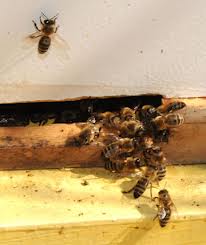
by Roy Carter | Jun 28, 2013
Honey bees laboriously gather their food (nectar and pollen) from flowers in bloom and store it in the hive for use when needed. When nectar sources are scarce or unavailable locally, bees are attracted by the honey stored in neighboring hives. Bees from strong...
by Roy Carter | Feb 22, 2013
Honey bee swarms are a normal sign of healthy honey bee colonies. Two types of reproduction occur with honey bees. First, there is individual (biological) reproduction from eggs laid by the queen. Second, there is colony level reproduction, or swarming. When a...
by Roy Carter | Oct 12, 2012
Roy Lee Carter – Gulf County Extension Director Although overwintering management of bee hives differs according to regional winter conditions, there are some fundamentals that apply everywhere. When helping your bees prepare for the upcoming hardships of winter...
by Roy Carter | Jun 8, 2012
Summer is often the time when most panhandle beekeepers have harvested their prime honey crops (TiTi, Tupelo, Gallberry and in some years Palmetto). If the beekeeper plans to reap a good honey harvest next year, hive maintenance must be top priority during the summer...


